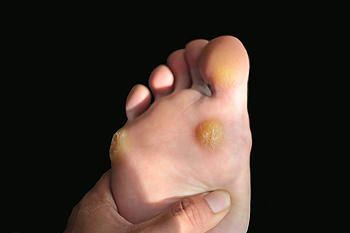 Warts are very common and come in many different forms. Plantar warts, also known as verrucae warts, differ from most other warts for various reasons. They only form on the sole of the foot and are a result of the human papillomavirus (HPV). They can easily be caught in places where there is moisture such as, locker rooms, pool areas, or saunas. Unlike most warts, plantar warts grow inward instead of outward. They plant themselves in the thick skin on the bottom of the foot, which can result in discomfort or pain. Discomfort and pain will increase when pressure is applied to the foot. Visually, they are flat, circular and have a small dent in the middle. Usually, they are dry with a black spot in the middle. If you think you might have plantar warts on the sole of your foot, then it is suggested you speak with a podiatrist in order to learn about treatment options.
Warts are very common and come in many different forms. Plantar warts, also known as verrucae warts, differ from most other warts for various reasons. They only form on the sole of the foot and are a result of the human papillomavirus (HPV). They can easily be caught in places where there is moisture such as, locker rooms, pool areas, or saunas. Unlike most warts, plantar warts grow inward instead of outward. They plant themselves in the thick skin on the bottom of the foot, which can result in discomfort or pain. Discomfort and pain will increase when pressure is applied to the foot. Visually, they are flat, circular and have a small dent in the middle. Usually, they are dry with a black spot in the middle. If you think you might have plantar warts on the sole of your foot, then it is suggested you speak with a podiatrist in order to learn about treatment options.
Plantar warts can be very uncomfortable. If you need your feet checked, contact one of our podiatrists from Sutera and Jones Surgical Podiatry. Our doctors will assist you with all of your foot and ankle needs.
About Plantar Warts
Plantar warts are the result of HPV, or human papillomavirus, getting into open wounds on the feet. They are mostly found on the heels or balls of the feet.
While plantar warts are generally harmless, those experiencing excessive pain or those suffering from diabetes or a compromised immune system require immediate medical care. Plantar warts are easily diagnosed, usually through scraping off a bit of rough skin or by getting a biopsy.
Symptoms
- Lesions on the bottom of your feet, usually rough and grainy
- Hard or thick callused spots
- Wart seeds, which are small clotted blood vessels that look like little black spots
- Pain, discomfort, or tenderness of your feet when walking or standing
Treatment
- Freezing
- Electric tool removal
- Laser Treatment
- Topical Creams (prescription only)
- Over-the-counter medications
To help prevent developing plantar warts, avoid walking barefoot over abrasive surfaces that can cause cuts or wounds for HPV to get into. Avoiding direct contact with other warts, as well as not picking or rubbing existing warts, can help prevent the further spread of plantar warts. However, if you think you have developed plantar warts, speak to your podiatrist. He or she can diagnose the warts on your feet and recommend the appropriate treatment options.
If you have any questions please feel free to contact one of our offices located in Media and Glen Mills, PA . We offer the newest diagnostic and treatment technologies for all your foot and ankle needs.
Read more about Plantar Warts